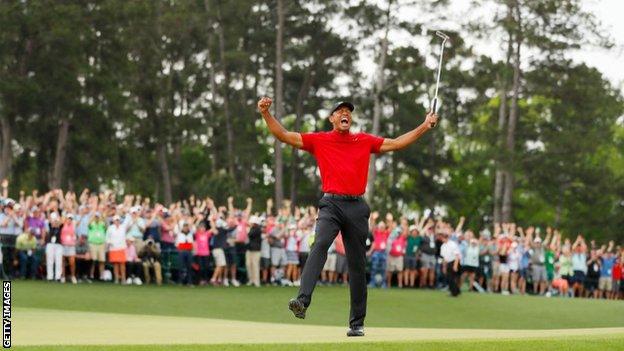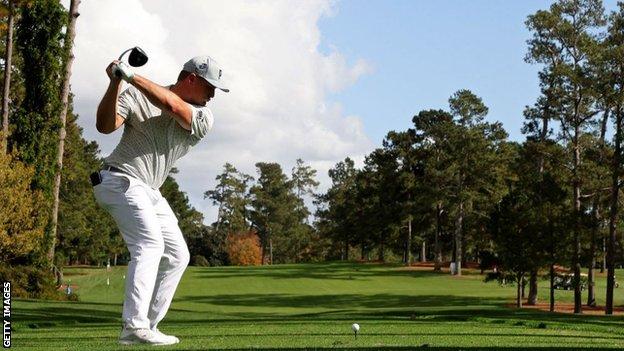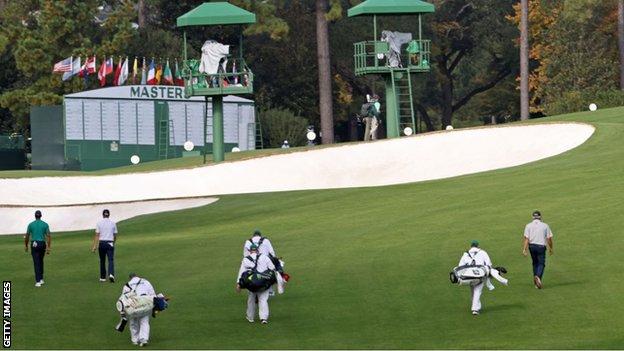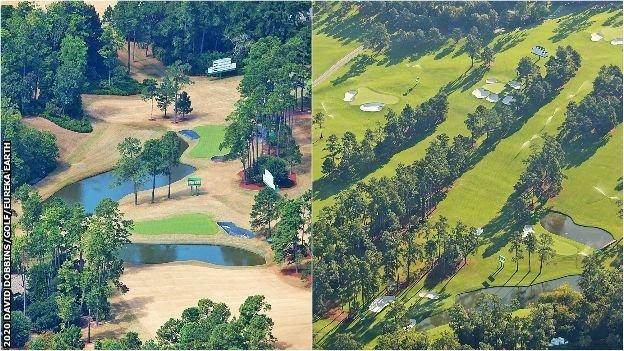In a year like no other, we are set for a Masters like never before.
Moved from its traditional spot in April because of the coronavirus pandemic, Augusta National will host the final major of this calendar year in unprecedented circumstances.

The field is the same as it would have been when the tournament was cancelled in March, but the picture is very different.
Autumnal hues have replaced the blooming shades of spring and the roars of the patrons have been silenced, with no spectators permitted on site.
But what does hosting the event in November mean for the players, the course and the local community?
‘Locals call it a second Christmas’
Nineteen months have passed since Tiger Woods slipped on a fifth Green Jacket but the absence of golf’s most iconic major and its patrons has been felt beyond Magnolia Lane.
“This is a huge blow,” explains sports writer Scott Michaux, formerly of the Augusta Chronicle. “It’s a massive economic engine for the community in so many different areas.”
The tournament provides an annual windfall said to be worth $100m (£76m) for the Augusta economy. More than 200,000 people pass though the city during Masters week, doubling its population.
Hotels hike up their rates to sometimes six times the average price, locals move out of town for the week to rent their properties to patrons and some nearby golf clubs sell tee times for $1,000.

“River Club, Champions Retreat, Forest Hills, Akin GC, Palmetto GC in South Carolina, they make an enormous amount of money that week, not just for the golf, but some cater and host social events in the evening and rent out their clubhouse,” says Michaux.
“Then you have the people who rent their homes, they count on that income every year – home-renters, caterers, they refer to the Masters as either a second Christmas or the 13th month of the economic year, that’s how big it is to the community.
“Every little industry you think of is affected by this in Augusta. You can’t replace not having it for a season. Augusta National is fine, they can go years without having fans and still be in great shape economically, but the community is hurt badly by it.”
The initial disappointment of a postponed Masters was offset by optimism when, in April, it was announced the tournament would be rescheduled for November, with patrons.
Schools in the surrounding area schedule their spring breaks to coincide with Masters week so that families can rent out their homes or students can get work – doing everything from picking up litter at Augusta National Golf Club, to working in merchandise or helping at food outlets.
Following the postponement, those schools moved the autumn break, which usually occurs in late October, back to November to marry up with the belated Masters. Then came the news it would not be possible to permit fans.
“People assumed they were going to get this bump in the fall rather than the spring,” adds Michaux. “Now the kids will be off, but there won’t be a Masters for them to work at.”
Playing into the hands of the big hitters?

The Augusta National ground staff are renowned for their meticulous preparation and the venue will no doubt look immaculate – every blade of grass clipped and coloured to perfection.
The greens should be in pristine condition. All 18 boast a subair system that can suck out moisture, enjoying their own microclimate that can be adapted depending on the time of year or whether the bentgrass putting surface is situated in the shade or sun.
The club says, with Augusta closed from mid-May to mid-October to prepare it for members in the autumn, the rescheduled Masters did not substantially alter their turf preparations.
However, the consensus is the track will play longer in November than it does in April because of cooler conditions and “stickier” fairways.
The reason for those, explains Michaux, is agronomy. The fairways have a base of bermudagrass which is scalped down and overseeded with ryegrass every September.
“The difference is it will be less mature than it is in April,” says Michaux, who will be one of 100 media personnel on site. “They might not be able to cut it down quite as low as they usually do on the fairways.”
Add to that the potential for stronger, changing winds and rain, with possible thunderstorms forecast on Thursday, and it could play into the hands of the field’s bigger hitters.
Read Also: Atalanta The Underdog Champions League Challengers With A Special Link To Fans
That will prick the ears of the likes of Bryson DeChambeau, who overpowered the notoriously difficult Winged Foot to win his first major at the US Open in September and recently posted an image from his launch monitor showing a drive which flew 403 yards in the air.
The American’s coach, Mike Schy, says a “soft” Augusta National would benefit his charge, who has experienced similar conditions when playing the course in December.
“When you look at Matthew Wolff, runner-up at the US Open, he was hitting it pretty far, but the fairways were hard and fast, whereas Bryson was carrying it 50 yards past him,” Schy told Sport.
“Seeing this week there will possibly be a little bit of cold weather, rain, thunderstorms coming in, the golf course is going to be super soft. So Bryson carrying it 320, 330 yards is a ginormous advantage.”
What will the course look like?

The absence of patrons means spots where crowds normally gather, like down the side of the 16th, and around many of the greens, will look different, but the course will also play differently without spectators.
“It’s not just the sheer fact that Augusta patrons are unbelievable and it’s awe-inspiring and intimidating in some ways,” says Schy. “But to have nobody there and be able to have a ball roll through something as planned is pretty cool. It makes that golf course way bigger.”
It has been suggested DeChambeau may use that to his advantage by driving over the pines to the left of the dog-leg par-five 13th to reach the 14th fairway, giving a better angle into the green.
“I think it is doable, because nobody is there to block the ball and end up in a bad spot,” explains Schy.
“It’s going to be interesting if that’s available. I’m not sure what the carry distance is to that fairway, if the ball is able to roll through there then that is definitely in play.”
Ground staff often make subtle adjustments to the site and the time of year means a two-tee start has been scheduled for Thursday and Friday, while Sunday’s final round is due to finish around 19:30 GMT, partly to fit in with American rights holders’ American football broadcasts.
“We are going to see a different golf course, a different kind of Masters – it will be quiet, you’ll be able to see things you don’t normally see,” adds Michaux.

And what about the azaleas…?
around 350 types of trees, shrubs, flowers and grasses grow at Augusta, formerly home of Fruitland Nurseries, so something will be flowering amid the towering pines this week, even if the traditional azaleas may have passed their peak.
Augusta say the club’s nursery team have instead decided to utilize “nandina, pampas, camellia and other plants that enhance the grounds in the fall”.
That said, Michaux says he has ‘Encore’ azaleas still blooming in his backyard in Georgia. These differ from those usually spotted at the Masters, but don’t put anything past Augusta National.
The azaleas will be on show in five months’ time when the Masters returns to its usual April slot, and Michaux says everybody has their fingers crossed that patrons will be there too.
“Augusta National chairman Fred Ridley said don’t throw away the plans because we might need them again in April,” says Michaux.
“There is a lot of concern. I would say it is 50/50, at best. If we’re in the same kind of situation, I think they’ll find a way to do it, at least on a limited basis.”
